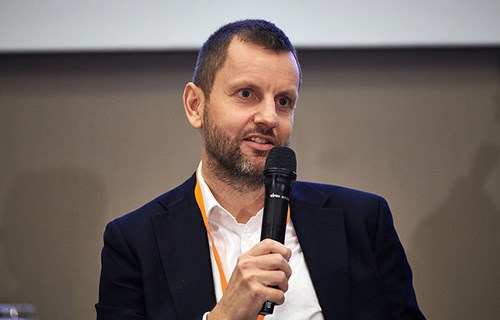Finance in football: Fair play or foul?

Alex Duff speaking at Play the Game 2017. Photo: Thomas Søndergaard/Play the Game
29.11.2017
By Marcus HoyAlex Duff, British journalist and co-author of Football’s Secret Trade told Play the Game 2017 that football’s transfer market has been infiltrated by third-part owners – in other words, investors who buy the transfer rights to players, often through shell companies, and profit when the player is transferred.
Often, he said, agents collude with smaller clubs to register without the players setting foot in the clubs concerned, as a means of channeling income. Although FIFA banned third party ownership in 2015, Duff said, it is not a criminal offence, and the global body is unable to scrutinize all deals. A possible method of curbing the practice, he suggested, would be a new rule requiring that the financial beneficiaries of each transfer be made public.
Jeppe Laursen Brock, a journalist at Denmark’s Politiken newspaper,revealed some of the tricks used by agents to avoid taxes on player transfers. The information revealed in the ‘Football Leaks’, details numerous avoidance methods ranging from the formation of complex corporate structures to simply neglecting to declare an agent’s involvement.
Complex corporate structures
Brock revealed the methods used by Real Madrid’s Cristiano Ronaldo to channel sponsorship money into a Swiss bank account, which enabled him to pay an effective tax rate of 3.8 percent. He also detailed a case where a player’s agent was officially described as working for the club that the player was transferred to, allowing the club to save an agents fee and reducing the player’s income tax liability. Another trick, he said, is the “disappearing agent”- a variety of tax avoidance options are possible if an agent’s involvement in a transfer is simply not declared.
Hans Nelen, Professor of Criminology at Maastrict University, detailed how investment in football is often a front for money laundering.
“Try paying fifteen thousand euros in cash into your bank account and see what happens,” he said. “You are likely to be reported. But if you invest millions in a football club, people look the other way. UEFA and other governing bodies seem to have little interest in the origin of these investments.”
Wealthy criminals, Nelen said, find it relatively easy to channel tainted money into football, often through mixing legitimate and illegitimate funds and using shell companies. “Fit and proper” requirements for investors, Nelen said, can often be circumvented as screening methods are relatively poor.
Like legitimate backers, he said, money launderers may not make a profit through their football investments. However, this is often not their primary concern, as they are involved in a specific line of business that they enjoy.
“Supervision and control can be a complicated task but it is also an important responsibility,” he said.
Stefan Kesenne, Emeritus Professor at the University of Antwerp, pointed out that fewer teams are reporting heavy losses today, as financial fair play rules could see them being excluded from UEFA’s club competitions. However, he added that a conclusive legal precedent is yet to be established on financial fair play, and whether UEFA has the legal right to exclude clubs from competitions due to outside investment.
Commercial entities
Wil van Megen, Legal Director of the world players’ union FIFPro, described how the definition of football clubs has changed from democratic sports organisations to commercial entities, meaning they are no longer subject to democratic principles.
While players were previously full “members” of the club they played for, van Megen pointed out, they are now employees no direct say in club policy. In some nations, he pointed out, players do not enjoy the same labour protections enjoyed by other employees.
The 1995 Bosman ruling, he added, has benefited EU football clubs more than the players themselves. Today, he said, players are rarely allowed to complete their contracts if their club decides to sell. A club may force the player to train alone or simply withhold his salary. However, if the club does not want to sell, players are rarely able to leave a club before their contract ends.
The increase in third party ownership, he said, can further dilute players’ rights as players’ “owners” have significant control over their careers. Under this system, he pointed out, profits are made from transfer fees, meaning club shifts are often imposed on players for non-sporting reasons.

Read more about Play the Game 2017





